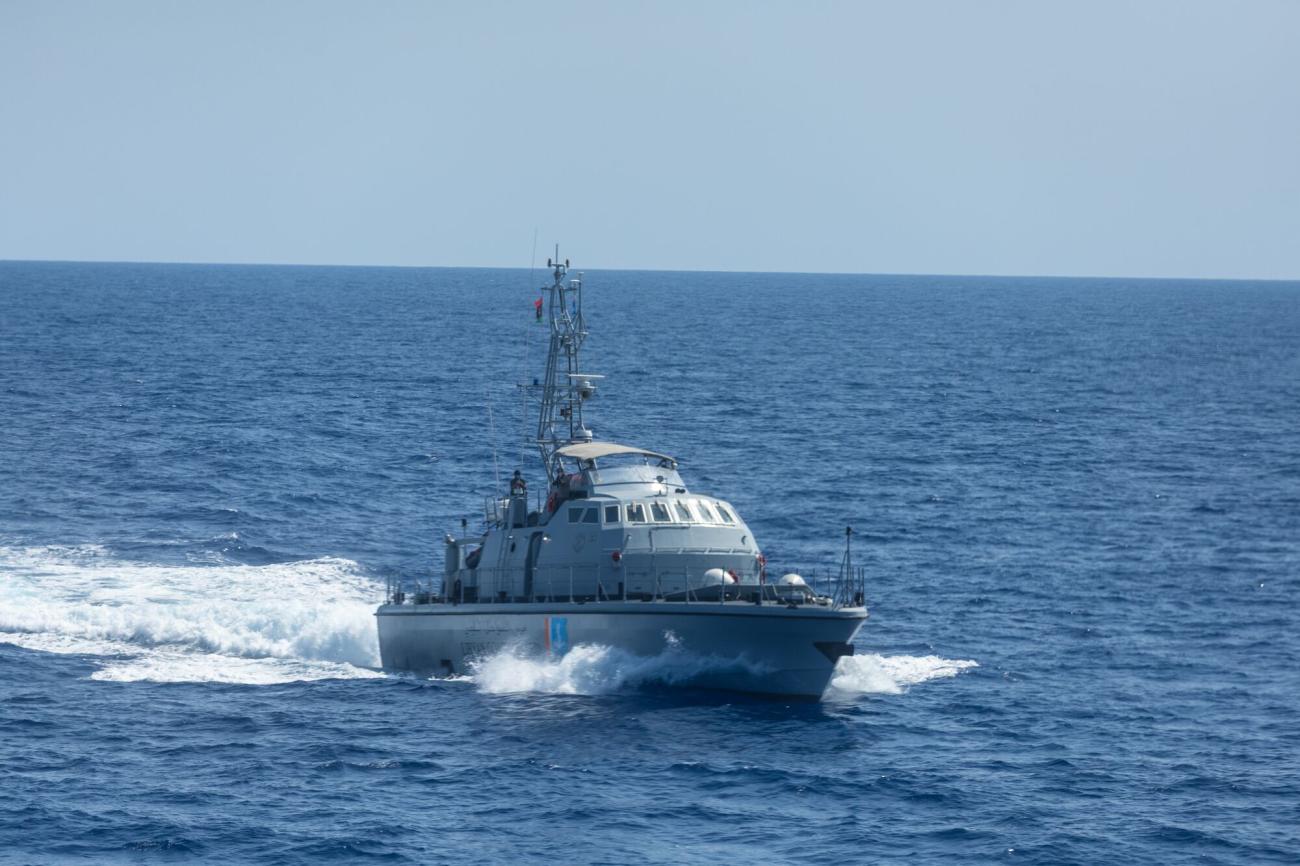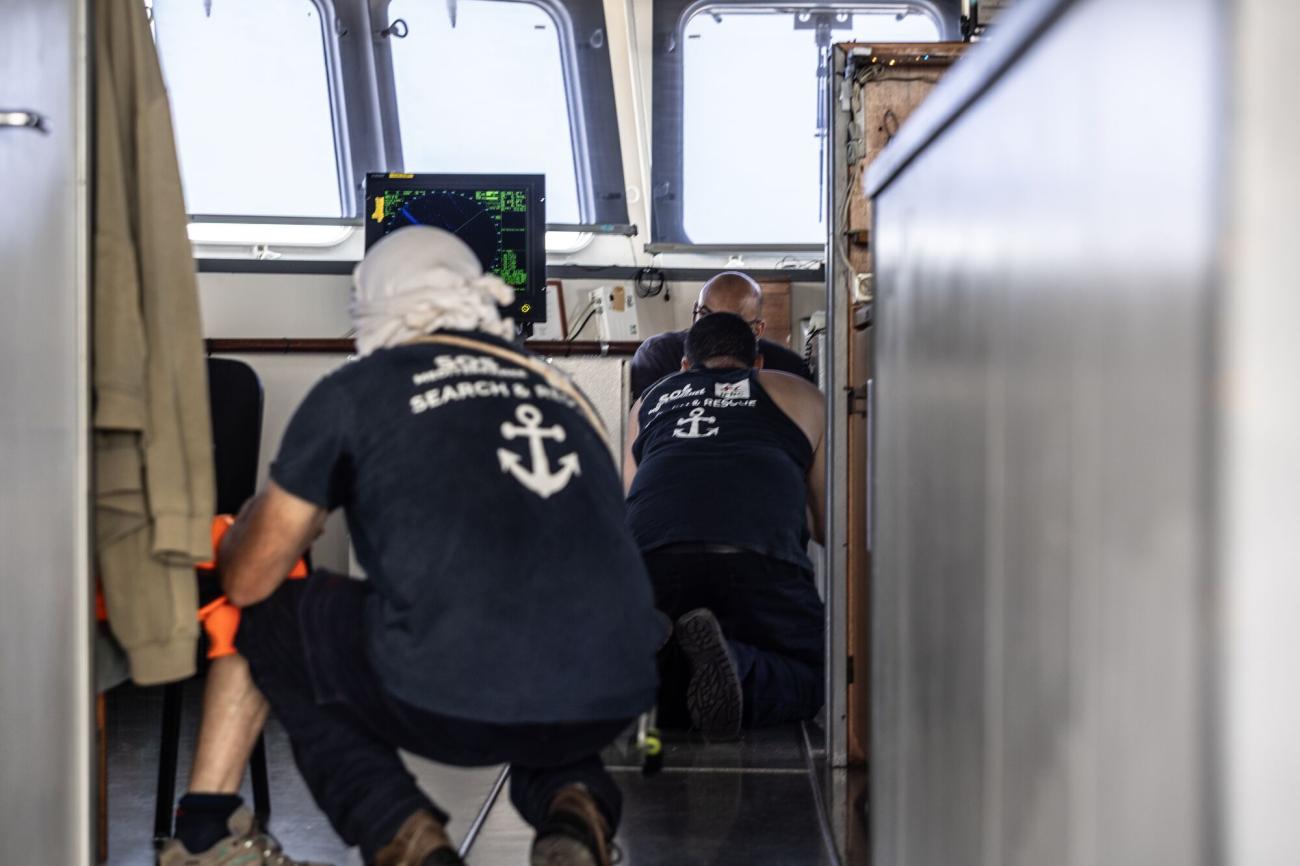The August attack by the Libyan Coast Guard on the MV Ocean Viking as it searched for a vessel in distress was another demonstration of how international law and the value of human life is being disregarded in the Mediterranean Sea.
The Ocean Viking had 87 survivors and 34 humanitarian and maritime workers onboard and was in radio contact with its attackers when, without warning, its bridge was showered with bullets.
The attack, by a Libyan Coast Guard Corrubia-class patrol vessel, occurred at 15:03 local time on 24 August 2025. The search and rescue vessel, chartered by SOS MEDITERRANEE in partnership with the IFRC, was in international waters approximately 40 nautical miles north of the Libyan coast at the time.
The survivors onboard, mostly from Sudan, had been rescued the night before, and Ocean Viking had been authorised by the Italian Maritime Rescue Coordination Center to pause its course to the assigned disembarkation port and instead search for an additional boat in distress.

The Libyan patrol vessel arrived and immediately demanded that the Ocean Viking leave the area and head north. The information was first given in English, then in Arabic, with translation by the Ocean Viking’s cultural mediator on board, who informed the patrol boat that the Ocean Viking would comply and was leaving the area. However, without any warning, two masked men aboard the patrol vessel opened fire on the humanitarian ship for over 20 minutes.
The attack involved over 100 bullets fired, some targeting the vessel’s bridge at head height. The quick action of the crew prevented anyone onboard from being physically injured, but the ship suffered significant damage including the destruction of multiple antennas, four broken windows on the bridge, and damage to rescue equipment including three fast rescue boats.
“What happened on August 24 was not a misunderstanding. It wasn't even an accident. It was a deliberate, targeted, and unprecedented assault on survivors, humanitarian workers, and seafarers in international waters,” said SOS MEDITERRANEE spokesperson Bianca Benvenuti. “They continued shooting in spite of the fact that we had changed course and communicated to them that we were heading north once again.”
SOS MEDITERRANEE has published audiovisual evidence of the attack on YouTube.
Rescue duty
After the incident, the Ocean Viking issued a mayday and alerted NATO, seeking protection and assistance. The crew were referred to the closest NATO asset — an Italian navy ship. However, the Italian Navy did not respond to their call.
The fate of the distressed vessel that Ocean Viking was searching for is unknown.
“They were openly asking us to disregard a distress case which is in breach of international maritime law and to leave the area. Every seafarer is bound to the duty of rescue people in distress at sea,” Benvenuti said. “Yet, of course, for the security of the survivors that we already had on board and the crew of the ship, we headed north.”
Escalation of lawlessness
It wasn’t the first attack the vessel has been subject to. In July 2023, the Ocean Viking was fired upon during a rescue operation by the same “664 Houn” Corrubia-Class vessel. Despite SOS MEDITERRANEE’s public requests, no enquiries were opened into the incident.
In March and April of 2024, NGO vessels Humanity 1 and Mare Jonio were both threatened at gunpoint by Libyan actors, reporting shots fired erratically which triggered panic that forced multiple people into the sea, with at least one person believed to have drowned.
Empowering armed actors
Marc Tilley, Mediterranean open-source intelligence analyst and former search and rescue crew member and researcher for the Centre for Humanitarian Action at Sea, wasn’t surprised by the escalation in violence that the August Ocean Viking attack represented. “However, I had expected that such an incident would come from a militia group operating in unmarked boats and balaclavas rather than a liveried Libyan Coast Guard asset that could be clearly identified and tracked.
“The increasing presence of black, unmarked boats, operating increasingly further from the Libyan coast, has long enabled Libyan authorities to pursue intimidation tactics against NGOs while maintaining plausible deniability. Coastal militia groups such as the GACS Support Force operating out of Zuwara have offered a convenient arms-length approach to carrying out deterrence through aggression and intimidation without directly implicating state institutions.”
Tilley says Libya is not a stable partner. “It's a fragmented, volatile fracture state where the line between state actors and armed militia groups is virtually non-existent.” This has led to an economic model where Libyan operators can profit by facilitating the departure of boats and then again by intercepting them for ransom.
There is a structural permissiveness that allows dangerous and unlawful practices at sea to go unchallenged, and often unnoticed, he says. “The Libyan Coast Guard and affiliated militias have been repeatedly and consistently documented engaging in reckless behaviour, discharging weapons at migrants and NGOs, employing intimidation tactics, or obstructing humanitarian rescues in international waters, yet meaningful investigations rarely follow, lesser still consequences. Instead, these same actors continue to receive funding, training, and political cover from European partners, empowering and emboldening them further.
“At the same time, humanitarian vessels fulfilling their legal duty to save lives are subjected to administrative sanctions, port delays, and criminalisation. This asymmetry reinforces the perception that state-backed violence is tolerated, while humanitarianism is penalised, at any cost. The consequence is a dangerous erosion of international maritime law.”
Risk to commercial trade
Commercial shipping could be impacted, says Tilley. When states fail to ensure the security of their flagged vessels, or even respond to Mayday alerts as in the Ocean Viking shooting, it further undermines confidence in rule-based order at sea.

“Merchant vessels, humanitarian actors, and even states conducting lawful activities in international waters now face an increased risk of misidentification or attack. That this occurred without any intervention or deterrence from NATO’s Operation Sea Guardian, whose mandate includes maritime situational awareness and counter-terrorism, creates what I would call a reassurance deficit in the Central Mediterranean. This undermines confidence in the safety of innocent passage and adds further operational risk to an already highly securitised space, with potentially costly implications for commercial fleets.”
The August attack on the Ocean Viking may prove to be a tipping point for the continued tolerance of Libya’s violent overspill onto the high seas. “An aggression of this nature, particularly against a civilian humanitarian vessel, not only risks undermining the EU’s decade-long efforts to legitimise and professionalise the Libyan Coast Guard but may jeopardise its continued financial and operational support from the EU and its Member States,” says Tilley.
Contrasting land-based legal stance
Since February 2023, NGO vessels operating in the Mediterranean have been subjected to 29 detentions, amounting to a total of 700 days spent in harbour instead of being available to rescue lives at sea. They spent an additional 822 days sailing to distant assigned disembarking ports.
Italian courts in Catanzaro, Reggio Calabria, Crotone, Vibo Valentia, and Ancona have issued decisions recognising the detention of NGO rescue ships at port as being unlawful and have annulled the related fines.
“There is a clear and deepening divergence between the Italian government’s operational stance on maritime rescue and the more rights-based approach upheld by its courts,” says Tilley. “On the one hand, the current administration has actively pursued policies that obstruct the work of humanitarian organisations at sea through regulations like the Piantedosi Decree, which restricts vessels to a single rescue before assigning distant ports for disembarkation, disproportionate administrative burdens, and the criminalisation of rescue efforts.
“Increasingly, SAR vessels are also facing legally dubious sanctions for failing to coordinate disembarkations with the Libyan Coast Guard; a legally contentious scenario which not only fails to account for the harms rescued migrants face on disembarkation in Libya but also implies extrajudicial powers over vessels operating outside Italian territorial waters. These actions form part of a broader political strategy aimed at deterrence, portraying search and rescue NGOs as contributing to irregular migration rather than fulfilling a legal and humanitarian mandate. These policy choices have exposed rescue crews to increasing operational risks and delays, sometimes with fatal consequences.
“Yet, in contrast, Italian courts have repeatedly affirmed the primacy of humanitarian obligations under international maritime law. From the acquittal of the Iuventa crew to decisions shielding search and rescue captains from prosecution, the judiciary has clarified that saving lives at sea is a legal duty, not a crime. The courts have further stated that if other coastal states fail to coordinate rescues or offer safe ports, Italian authorities cannot penalise NGO vessels for disembarking survivors in Italy.”
Remedial action
In November 2025, the Italian government will potentially renew the memorandum of understanding it has with Libya which facilitates much of the cooperation on migration between the two nations.

Soazic Dupuy, SOS MEDITERRANEE Director of Operations, has called for an immediate end to all European collaboration with Libya. “A party that makes unlawful claims in international waters, deliberately obstructs rescue efforts to people in mortal danger, and targets unarmed humanitarian workers and rescued people cannot be considered a competent authority. We cannot accept an internationally recognised coast guard carrying out unlawful assaults. Furthermore, we call for an end to the criminalisation of rescue which only creates fertile ground for these incredibly vicious attacks.”
On 5 September, SOS MEDITERRANEE announced that it has filed a criminal proceeding before Italian prosecutors – who have already opened an investigation. The complaint requests prosecution for attempted multiple homicide, attempted shipwreck, and damage to the Ocean Viking.
Legal action will also be pursued at international level to address the responsibility of the chain of command within the Libyan Coast Guard and of institutions and states that continue to finance, equip, and train it.
Meanwhile, SOS MEDITERRANEE will continue its efforts, says Benvenuti. “We are absolutely committed to continue our mission and to continue rescuing people in the central Mediterranean Sea, and we will try our best to go back as soon as possible.”
ENDS.
Source: Human Rights at Sea 2025. Reporter: Wendy Laursen.
Certified Original. AI was not used in the drafting of this article.
Photo Credits: SOS MEDITERANEE Max Cavallari 2025.
Contact: If you have any questions, please write to us at enquiries@hrasi.org.
About Sharing. We welcome the use and dissemination of our copyrighted work with full, accurate and proper accreditation. Open Access This article is licensed under a Creative Commons Attribution 4.0 International License, which permits use, sharing, adaptation, distribution and reproduction in any medium or format, as long as you give appropriate credit to the original author(s) and the source, provide a link to the Creative Commons licence, and indicate if changes were made. The images or other third-party material in this article are included in the article's Creative Commons licence, unless indicated otherwise in a credit line to the material. If material is not included in the article's Creative Commons licence and your intended use is not permitted by statutory regulation or exceeds the permitted use, you will need to obtain permission directly from the copyright holder. To view a copy of this licence, visit http://creativecommons.org/licenses/by/4.0/.
©Copyright and Intellectual Property of Human Rights at Sea CIC (HRAS) 2025. All rights reserved.
